

Sub Club by RevenueCat
David Barnard, Jacob Eiting
Interviews with the experts behind the biggest apps in the App Store. Hosts David Barnard and Jacob Eiting dive deep to unlock insights, strategies, and stories that you can use to carve out your slice of the 'trillion-dollar App Store opportunity'.
Episodes
Mentioned books
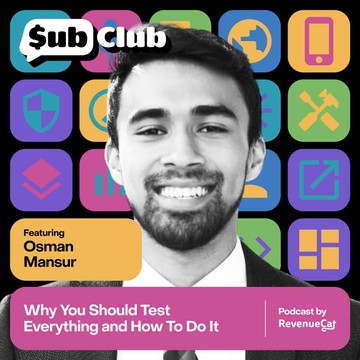
112 snips
Jan 4, 2023 • 54min
Why You Should Test Everything and How To Do It — Osman Mansur, Duolingo
On the podcast we talk with Osman about Duolingo’s culture of experimentation, data and testing as a moat, and why passive aggressive push notifications actually work in the right context.Top Takeaways🧪 Leverage a culture of experimentation to create a top user experience📊 Data and testing are Duolingo’s best moat👍 Passive-aggressive push notifications might work in the right contextAbout Osman Mansur👨💻 Product Manager (PM) at Duolingo, the global language learning app with close to 60 million active users.💪 As PM on the retention team, Osman plays a key role in maximizing user engagement and retention through specific mechanics, with a dedicated testing and experimentation regimen.💡 “Just by the sheer amount of data that we collect, we're really able to drill down and optimize a lot of things on the app. And it keeps us busy as a product team, because there's so much stuff that we know we can improve.”👋 LinkedIn | MediumLinks & Resources‣ Duolingo’s findings on notifications (Twitter thread)‣ Duolingo’s findings on streak rewards (Twitter thread) ‣ How does Duo decide what message to send? The secret is in the AI! ‣ The habit-building research behind your Duolingo streak ‣ Join the Duolingo teamFollow us on Twitter‣ David Barnard‣ Jacob Eiting‣ RevenueCat‣ Sub ClubEpisode Highlights[2:08] Test everything: Osman explains how the data Duolingo collects and analyzes is one of the company’s best moats.[5:26] Ideation generation: Sometimes the bottom-up approach works best for driving team roadmaps, but iteration and experimentation is at the heart of Duolingo’s testing process.[11:02] Cooperation, working together: At Duolingo, teams share what they’ve learned with each other to create a better product, but they also cross over on analysis and experimentation.[17:48] Looking back: To track long-term impact, Duolingo uses holdout experiments and looks at feature-level metrics via dashboards[25:34] Notifications 101: Osman explains how a big driver of retention and company growth has been its notification strategy, learning a lot about what does and doesn’t work along the way.[33:35] Let’s get creative: The secret to impactful retentive notifications is getting the tone right, and even conversing with users. Sterile voices don’t work — opinionated voices just might.[37:30] Keep it simple: Messaging and theme matters for notifications, and so does copy length. Reduce cognitive load to increase willingness to engage. But once you’re in the app, you can get more complex for engaged users.[40:10] Emoji titles: Osman’s team discovered that emojis are actually better in the title than in the body. Why it’s an attention grabber is still a mystery.[41:53] Falling flat: Not every experiment works, but there are still great lessons to learn. The tone of an organic character works better than a brand talking to users like marketers.[46:33] Keeping the streak going: The streak is one of the best Duolingo retention mechanics, Osman explains. He dives into how the company tinkered with it to prevent domino effect user drop offs, and how the streak widget works in iOS.
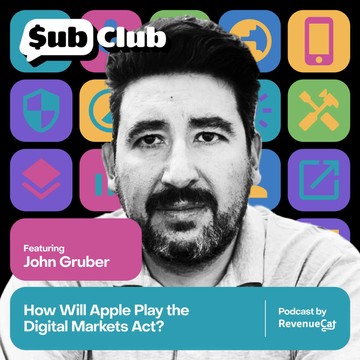
Dec 21, 2022 • 1h 12min
How Will Apple Play the Digital Markets Act? — John Gruber, Daring Fireball
On the podcast we talk with John about the far reaching implications of the European Union’s Digital Markets Act, how app developers should be thinking about the opportunities created, and why Apple making so much money from the App Store might be bad for Apple long-term.Top Takeaways⚖️ The EC’s DMA is set to shake things up in a big way — but how isn’t completely clear🪟 Don’t panic, app developers — the DMA creates opportunities, too🤑 The profitability of the App Store might not be good for Apple in the long-termAbout John Gruber👨💻 John runs Daring Fireball, is host of The Talk Show podcast, and co-hosts the Dithering podcast.💡 “One of the rules in the App Store is that you cannot explain the rules of the App Store in your app.”👋 TwitterLinks & Resources‣ Mark Gurman’s article on how Apple is responding to the EU’s DMA‣ If a Third-Party App Store Falls in the Forest and No One Uses It, Does It Make a Sound?‣ Check out Daring Fireball‣ The Dithering podcast‣ The Talk ShowFollow us on Twitter‣ David Barnard‣ Jacob Eiting‣ RevenueCat‣ Sub ClubEpisode Highlights[2:03] Get ready: The European Commission’s 100-page Digital Markets Act is going to seriously shake things up in a major bid to regulate big tech. But what is it, what does it mean, and who does it apply to?[11:00] Keeping it cordial: Apple’s relationship with the Japan Fair Trade Commission during similar legislation was respectful. It’s not clear the same can be said of their dealings with the EU.[13:24] The ABCs of USB: Whatever your feelings on legal mandates for USB ports, at least it’s clear. Not so with the DMA, John argues.[18:14] We don’t care: John believes that the EC’s priorities aren’t aligned with developers or consumers. There are lessons from the Dutch case of dating apps with a huge 27% commission charged by Apple, as well as constraints on Netflix selling inside the app.[24:26] Payment processing vs. licensing: 30% is a very expensive payment processing fee. But Apple views it as a licensing fee — a privilege to run your software on their system.[38:07] The eye of the apple: Will Apple soften up or is it just money-grabbing? Apps have morphed as Apple didn’t realize how popular the iPhone could become, and App Store commission is a large part of its current growth.[44:37] Multiplatform allure: If Apple is seen as an untrustworthy partner with poor App Store management, developers might want to develop across different platforms and avoid relying solely on Apple — even if its exclusive apps have typically been the most successful.[51:21] What gives, Google?: Despite being allowed, there’s a mystery around why sideloading and third-party app stores never really took off with Android. (Hint: They can’t reach mass adoption.)[58:26] The two big turning points: The DMA makes clear that within the app, apps can talk about outside payments, which means Apple now has to compete with web payments. Can Apple charge its commission on sideloaded apps and/or 3rd party app stores?[1:01:08] Global continuity: Even a fully enforced DMA isn’t existential for Apple. The question of when they’re going to do right by the platform is up for debate.
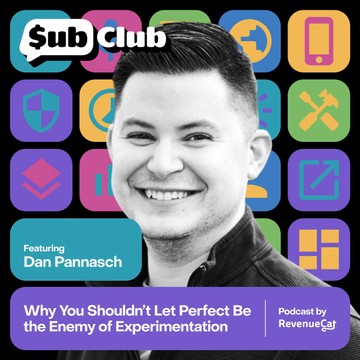
Dec 7, 2022 • 1h 3min
Why You Shouldn’t Let Perfect Be the Enemy of Experimentation — Dan Pannasch, RevenueCat
On the podcast I talk with Dan about how to design experiments that answer the right questions, common A/B testing pitfalls to avoid, and how a simple checklist might just save your complex experiment.Top Takeaways🍞 Conclusions from tests sometimes go stale faster than you realize👌 Minimizing the cost of running tests will improve decision making🤪 Check your sanity — or don’t live and die by statistical significanceAbout Dan Pannasch👨💻 Senior Product Manager at RevenueCat💪 Dan saw what experimentation looked like across a portfolio of app businesses when his previous company TelTech’s success led to an acquisition by IAC. He joined RevenueCat in May 2022 and leads the Experiments project.💡 “You could change the color [of the buy button in A/B testing and] release it in the new application. And if you can't tell which one won [with users], then you learned that it doesn't matter. You didn't learn which one won, but you did learn that it doesn't matter for you right now.”👋 Twitter | LinkedInLinks & Resources‣ Join the RevenueCat team‣ Sub Club interview with Blinkist’s Jaycee Day‣ RevenueCat’s Experiments toolFollow us on Twitter‣ David Barnard‣ Jacob Eiting‣ RevenueCat‣ Sub ClubEpisode Highlights[2:18] Experimentation: What is app experimentation and why should you do it? The right decision making, considering impact on variables, and risk mitigation are everything when it comes to user experience.[9:04] Taking a page from DuoLingo’s playbook: Product strategy and intuition naturally limits possibilities — and it’s not the place for A/B testing. Microdecisions within deliverables are testable, and then it’s just cost-benefit analyses. [14:04] The early days: The cost-benefit analysis should pervade every stage of the process, from early growth and beyond. Trying to design the perfect A/B test isn’t always possible when customers are begging you for.[19:20] Paywall plays: Where you put the paywall is a tough decision. But there are strategies for implementation and risk mitigation.[24:35] Testing 101: Be sure to write down the hypothesis before testing so that you can measure impact. Unexpected results — where you learn the most about variables — depend on it.[28:05] Follow it up: Dan shares his thoughts on user follow ups to boost quantitative data with qualitative data. Sometimes talking to users can be very powerful.[31:13] Sanity check: How to do a testing plan, as done by Dan during his time as a PM at TelTech. Plus, an explanation of statistical significance.[39:53] Impact and intuition: To understand user experience impact and product intuition, it’s critical to ensure the design aligns with the value proposition.[42:22] Actual testing: There are pitfalls and screw-ups to watch out for when testing (and even before).[46:33] Analyzing the results: Dan provides his overview for analyzing the results after running the experiment. Second and third order effects are important but not always immediately obvious. [48:41] The Experiments product: RevenueCat’s new tool enables easy A/B testing for two offerings. The data helps you analyze the full subscription lifecycle to understand which variant is producing more value for your business.[55:55] Bugs: No product will ever be perfect, but Experiments offers app developers the tools and confidence to make sure it’s at least most of the way there.
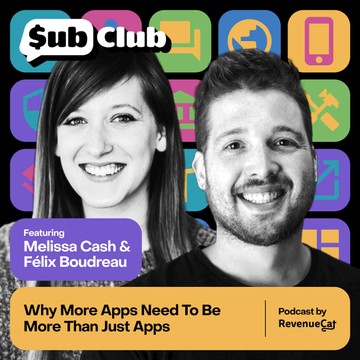
6 snips
Nov 23, 2022 • 59min
Why More Apps Need To Be More Than Just Apps — Melissa Cash & Félix Boudreau, Pok Pok
On the podcast I talk with Melissa and Félix about why more apps should be more than just apps, the benefits of a hard paywall, and why a lower price might actually make you more money even if the A/B test shows it didn’t.Top Takeaways📱 More apps should be more than just apps💳 Hard paywalls can (and do) sometimes pay off💵 How a price change can lead to big returns — if the quality is thereAbout Melissa Cash & Félix Boudreau👨💻 Melissa is Co-Founder and CEO and Félix is Head of Growth at Pok Pok💪 Their first app, Pok Pok Playroom, is an Apple Design Award-winning preschool app that sparks creativity and imagination through open-ended play💡 “It's important to think about your updates from a content and subscription value point of view, but also from a marketing point of view, and really try to balance those narratives.” — Melissa👋 Melissa on LinkedIn | Melissa on Twitter | Félix on LinkedIn Links & Resources‣ Pok Pok Playroom‣ Watch the app trailer on YouTube‣ A mother's entrepreneurial inspiration ‣ Melissa on The Mom Halo podcast ‣ The Apple Design Award Story ‣ Melissa on the Snippets of Genius podcast Follow us on Twitter‣ David Barnard‣ Jacob Eiting‣ RevenueCat‣ Sub ClubEpisode Highlights[1:40] Empowered play: What could it look like to equip and educate today’s children to think for themselves? Melissa shares the story of how her co-founders wanted to empower creative, independent play for their young son in a digital space.[6:16] More than an app: There’s a much broader vision for Pok Pok in the works. Starting digital in a digital era gives the app a head start against business models that have been adapted to become digital.[10:47] Investing in the future: The team at Pok Pok places a “hive mind” focus on the long-term strategy of the brand. They aim to earn the trust of parents (as well as their kids) for the best possible customer experience.[13:15] You are the prototype: What did it take to build Pok Pok into an award-winning, successful app? Melissa shares about their robust testing and prototyping process.[16:57] The data tracks: Félix talks about how to balance the protection of qualitative and quantitative data while getting the most out of what you can safely track and collect. They use intrinsic motivation to keep kids playing in healthy ways — a win-win-win for everyone.[24:19] The monetization conversation: Creating an app that keeps evolving was the key to recurring revenue. Continual content with real value creation — for the parent as much as for the child — was the way forward.[27:06] Easy lessons from a hard paywall: Testing the hard paywall took a lot of tinkering — resulting in some unintended (but welcome) consequences in user behavior. Now, there’s a video paywall in the pipeline.[40:19] The price is right: Félix and Melissa discuss how to find the sweet spot with price testing that enables solid paid acquisition and LTV. Ultimately, doubling the price led to double the revenue.[46:18] The power of storytelling: Subscription app entrepreneurs should learn how to tell good stories. Melissa and Félix share their wisdom about creating compelling stories in business and networking, as well as the importance of great in-app events.
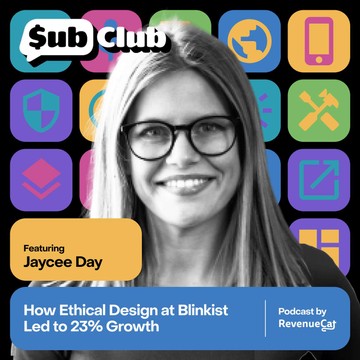
Nov 9, 2022 • 42min
How Ethical Design at Blinkist Led to 23% Growth – Jaycee Day
On the podcast we talk with Jaycee about how Blinkist increased trial starts by 23%, how to balance user experience with business objectives, and why telling people how to cancel can actually lead to fewer cancellations.Top Takeaways⚖️ Balancing ethics and business means making tough decisions, but taking a smart approach lets you master both🤝 Helping people unsubscribe isn’t the most intuitive thing for subscription app businesses, but ethical design patterns might be better for business in the long run🔎 Transparency around the cancellation process can drive app success in multiple waysAbout Jaycee Day👨💻 Senior Product Designer at developer platform GitHub and previously at Blinkist💪 Jaycee facilitated a sign-up increase of 23% following customer service complaints (which also dropped by 55%) at Blinkist. Even Apple took notice of her ethical design pattern💡 “It's because of the transparency and the trust. … People have been burned so many times through other apps that it benefited us. … [Users thought,] Finally, an app that I can trust — they know how I feel, and they're listening. That was just super important: Letting people know that they can cancel [and that] they don't have to be scared of us.”👋 Jaycee Day | LinkedIn | Twitter | Medium | GitHubLinks & Resources‣ The story of Blinkist's 23% Conversion‣ Ethical design pattern at AppleFollow us on Twitter‣ David Barnard‣ Jacob Eiting‣ RevenueCat‣ Sub ClubEpisode Highlights[1:47] Origin story: From founding to freelancing, Jaycee helped transform Blinkist in under three years.[3:52] Internet fame: The ethical design pattern Jaycee helped evolve offers subscription apps the ability to understand the product discovery process in a different light. She talks about its inception at Blinkist.[9:05] Zombie subscribers: The balance between business and ethics isn’t always easy to strike. Jaycee explains how customer empathy helped with product design.[11:51] The first pitch: The early stages of ethical design and the goal of reducing customer complaints initially came from trial reminder testing. The reminders had the unintended positive consequence of increasing push notifications.[16:29] The big rollout: With things on the up and up for Jaycee and her team, they built an A/B test prototype with “overwhelmingly positive” results.[20:47] You can stop complaining now: A 55% drop in customer complaints wasn’t just theory. Why did it work so well?[24:03] Mission unsubscription: It may not be the most intuitive thing for subscription apps to help people who don’t want to be subscribed to unsubscribe. But this effort brings indirect benefits like reducing cancellations and increasing trial sign-up rates.[27:21] Retain and engage: Jaycee discusses how Blinkist was limited in its tracking capacities, but it used some unconventional markers to establish that the efforts were working.[31:10] The biggest subscription app article of the year: Promoting principles via the user experience community brings more attention and business success.[33:48] The aftermath: People care about the ethics of user experience as well as the business side. Jaycee discusses the major ripple effect of the ethical design she spearheaded: Case in point, Apple features it on their website.
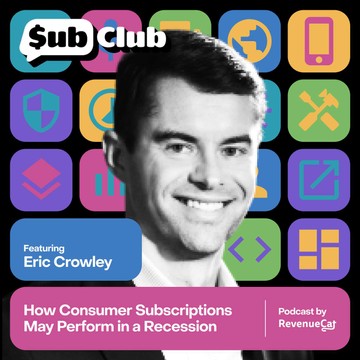
Oct 26, 2022 • 51min
How Consumer Subscriptions May Perform in a Recession — Eric Crowley, GP Bullhound
On the podcast we talk with Eric about the largest consumer marketplace that’s ever existed, the growing exit opportunities for Consumer Subscription Software businesses, and why the CSS industry may be relatively recession-proof.Top Takeaways👀 Simply occupying eyeballs isn’t the game plan anymore💰The CSS space could be recession-proof👴 The data and tooling landscape has matured, making it easier to build and grow subscription businessesAbout Eric Crowley👔 Partner at GP Bullhound, a global technology investment and advisory firm for entrepreneurs and founders👨💻 Coming from an executive software startup background, Eric primarily focuses on M&A, capital raises, and advisory transactions at the firm💡 “If the entire focus of your team is adding value and not just making sure information flows from stack one to stack two, you're going to build a better business, because you're out there listening to your customer [and] watching them use your service”👋 LinkedIn and TwitterLinks & Resources‣ Check out the Consumer Subscription Software (CSS) 2022 report‣ GP BullhoundFollow us on Twitter‣ David Barnard‣ Jacob Eiting‣ RevenueCat‣ Sub ClubEpisode Highlights[1:58] Mind-blowing CSS report insights: Apps are instantly downloadable and purchases are immediate for 5 billion people around the world.[5:10] What the internet was meant to be: Apple is the new cross-border cash clearing house, and apps are leveraging some of the most advanced technology we have today.[7:39] The end of apps?: There’s a reason to be bullish on the subscription business model. David explains why.[10:52] Record-breaking non-game app revenue: For the first time in 2022, people are spending more on apps other than gaming.[13:27] Having fun with luxury goods: With a downturn on the horizon, will in-app purchases take a hit? Why spend money on Candy Crush when you can still have fun for free? GP Bullhound sees CSS businesses as “enhancements at an affordable price.”[20:09] Where’s the value?: During a recession, the bar for added value increases. Where does that leave subscription services? If it makes you better at your job (like Grammarly does for Eric), it’s a winner.[21:40] On bankers hating averages: Eric talks overvaluations, undervaluations, and the sturdy infrastructure of the industry. (Hint: DuoLingo, Dropbox, and Bumble will be here in five years.)[28:22] Cashing in on subscriptions: The cash efficiency of the consumer subscription model is finally beginning to show. Eric highlights that CSS entrepreneurs are gold miners, with plenty of companies selling them shovels and pickaxes.[35:13] Exit stage right: From PE firms to small investors, opportunities to exit apps are many. Eric explains what that looks like for brands, consumers, and founders.[40:38] Philosophy of selling: Eric sets out the thought process founders go through and the questions they should answer before moving ahead with a sale.
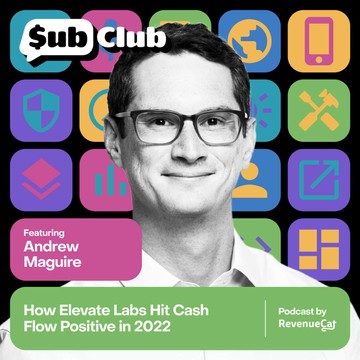
Oct 12, 2022 • 54min
How Elevate Labs Hit Cash Flow Positive in 2022 — Andrew Maguire, Elevate Labs
On the podcast we talk with Andrew about the journey to cash flow positive for Elevate Labs, the importance of creative, and why spending less money can sometimes be the key to figuring out paid user acquisition.Top Takeaways📈 The journey to cash flow positive is a long one, demanding tough decisions along the way💵 Spending less money can sometimes be the key to figuring out paid user acquisition🎨 Control and collaboration are key elements of a creative cultureAbout Andrew Maguire⚙️ Chief Operating Officer at Elevate Labs and Managing Partner at Volo Ventures💪 Andrew saw Elevate move from rolling back on ad spend in order to survive, to becoming cash flow positive with record growth in 2022.💡 “How do you have values that are not just the poster on the wall that no one cares about, but are actually lived in the organization?”👋 LinkedIn and TwitterLinks & Resources‣ Join the Elevate Labs team‣ Connect with Andrew on Linkedin‣ Follow Andrew on Twitter‣ Volo Ventures ‣ Elevate App ‣ Balance App Follow us on Twitter‣ David Barnard‣ Jacob Eiting‣ RevenueCat‣ Sub ClubEpisode Highlights[1:46] Inspirational investment: Making waves at Elevate, Volo Ventures invested in RevenueCat based on Jacob’s juice for building a big company and solving real problems.[6:48] Early elevation: The duality of Volo Ventures and Elevate gives Andrew insight to create great apps while investing at the same time.[10:25] Living organizational values: An ongoing commitment to incorporate company mission into every aspect of work — from hiring to recognition and performance — is what makes a company really stand out.[13:25] Pay to play: You need to spend money to make money. Jacob and Andrew discuss getting a handle on LTV, plowing money into advertising, the subscription model, and trials.[19:20] The slow degradation of ATT: It’s not an overnight thing, but Elevate still took a hammering.[21:26] Circling the wagons: Andrew talks about the experiments they ran, what worked, and what failed, including pulling back ad spend.[24:32] The importance of creative and the power of ads: Everyone taking responsibility for the quality of the product builds a culture of creativity with ideas coming from all angles.[33:22] Blending acquisition costs: When you’re building a second app, you can leverage the customers you already have for the old one to build an even better product. And sometimes free giveaways can scale ad spend in asymmetric ways.[40:25] Becoming a “real business”: Hitting cash flow positive feels really good. Andrew found that focusing on being lean and scrappy allowed them to scale the business without having to raise more capital.[46:13] The Volo connection: Andrew, David, and Jacob discuss what’s happening at Volo Ventures.
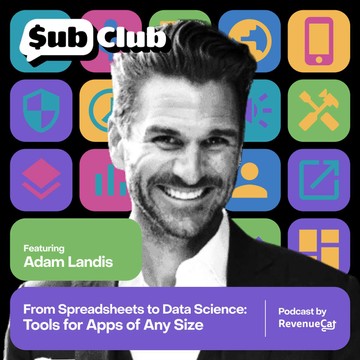
10 snips
Sep 28, 2022 • 54min
From Spreadsheets to Data Science: Tools for Apps of Any Size — Adam Landis, AdLibertas
On the podcast we talk with Adam about when and why to use an MMP, which subscription events to track in your analytics, and why A/B testing doesn’t always work the way you think it works.Top Takeaways📏 Understand what your users are doing to help define — and then achieve — your goal📈 Spreadsheets are a great start, but growing sophistication requires something more long-term🔧 Turning events into actions is difficult but necessaryAbout Adam Landis👨💻 Founder and CEO at AdLibertas💪 Adam has helped hundreds of apps — including Crossy Road, Temple Run and Audio Mac — influence user behavior through data collection and analysis.💡 “How do you make sense of all this data that's coming out of the app? How do you understand what users are doing? What is the impact? And then what is the outcome of the changes you make?”👋 LinkedIn | AdLibertasLinks & Resources‣ Learn more about AdLibertas‣ Read AdLibertas updates from Adam‣ Follow AdLibertas on LinkedinFollow us on Twitter‣ David Barnard‣ Jacob Eiting‣ RevenueCat‣ Sub ClubEpisode Highlights[1:44] The OG of apps: At the genesis of the App Store, Google and Apple fought over ads — and that’s when Adam got started. AdLibertas was born just a few years later out of the need to understand the data coming from users.[6:34] The progression of data sophistication: Brand new app developers are hungry for thousands of data points. But are those really necessary at the beginning? Adam dives into startups getting to 1.0, understanding product market fit and balancing product versus infrastructure.[9:39] View from the data stack: Adam talks about minimum viability and the importance of understanding what your users are doing before anything else.[15:27] Every app is unique, but data speaks uniformly: How do you do deep, complex analysis early? Adam offers a smart strategy on what metrics apps should track to garner the most valuable insights.[24:16] Blending freemium and subscription is an art: Getting sophisticated and buying users means understanding their long-term value and the real sources of ROI.[25:57] The essential MMP stack: Adam and David discuss the when, what and how of MMPs.[31:56] SKANing: It’s the mess that no one wants to talk about. But don’t worry: It’s okay not to understand because no one knows what’s going on.[34:36] All praise to A/B testing: When it comes to A/B tests, losing can be better than winning. Adam explains that the proper way to test is to set the boundary before the test and not look at the data during testing.[40:05] CRM campaigning: Adam and David talk about getting the most out of CRMs in terms of retention and re-engagement.[47:13] In with the old, in with the new: Do you focus more on product or marketing? It depends on how big you are.
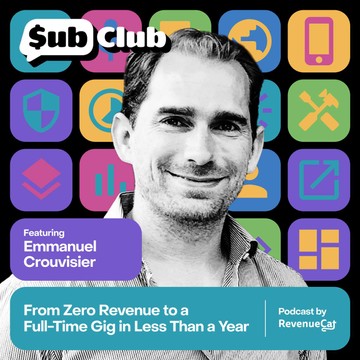
11 snips
Sep 14, 2022 • 52min
From Zero Revenue to a Full-Time Gig in Less Than a Year — Emmanuel Crouvisier, CardPointers
On the podcast we talk with Emmanuel about the magic of affiliate marketing, how to best use Stripe payments, and why you should probably build a web app before you build a native one.Top Takeaways✉️ Don’t skip user registration — and do it early in onboarding💰 The road to subscription revenue isn’t a straight one📈 The little things add up over timeAbout Emmanuel Crouvisier👨💻 Founder at CardPointers, an app that makes it easy to optimize credit card rewards and has saved users over $200M.💪 Emmanuel used affiliate marketing and a revenue share model to increase user retention, simultaneously rewarding loyalty and content creator talent.💡 “Keep your costs really low. […] The companies that have been in this space before never last more than two years because they need a team of [up to] 30 people to run everything. Whereas [with CardPointers], it's just me, and my costs are literally hundreds of dollars per month — so it makes it easy for me to make a good business out of it.”👋 Twitter | LinkedInLinks & Resources‣ CardPointers on the App Store‣ CardPointers on Twitter‣ Special Offer for Sub Club listenersFollow us on Twitter‣ David Barnard‣ Jacob Eiting‣ RevenueCat‣ Sub ClubEpisode Highlights[1:42] Building inspiration: Emmanuel discusses what inspired him to found CardPointers, getting turned on to the world of credit card rewards and realizing just how much revenue subscription apps can bring.[7:21] Exhausting side hustle: Early on, CardPointers was an evenings and weekends-based project, applying smart strategies combined with persistent tinkering.[11:15] Decisions, decisions: Emmanuel explains the decision he made in the early building phase, as well as his lucky break with Apple iOS 13 and watchOS 6.[17:30] Same system, same project: Emmanuel discusses the benefits of a backwards compatible API with proper user accounts created from the get-go, reducing sign-up friction.[19:47] The affiliate backdoor: On launch, he didn’t have any partnership links set up and he wasn’t getting anywhere by going through official channels. He got better results by reaching out to people through LinkedIn. [23:26] $1,000 a month sounds cool: Though he was making progress with affiliate revenue, it’s not all easy and there are a lot of rules around compliance. This made a subscription model more attractive, and led Emmanuel to devise the pro tier for paying users.[27:22] Understanding employers: It can be nerve-wracking to quit your day job. Emmanuel talks about how he managed the transition. He lucked out because his employer was supportive, too.[31:52] Blow-up business: Emmanuel talks about how his current roadmap really shifted the trajectory of the business, including imminent plans in the pipeline.[35:23] Big-time consumer: Studying up before — and during — the startup phase is crucial for unlocking your app’s real potential. Emmanuel learned (and continues to learn) from an array of sources including webinars and Twitter communities.[42:40] Influencing the market: So many apps need to find the kind of product-channel fit CardPointers has in terms of influencer and affiliate marketing. Emmanuel explains how it took off as a channel that worked for him.
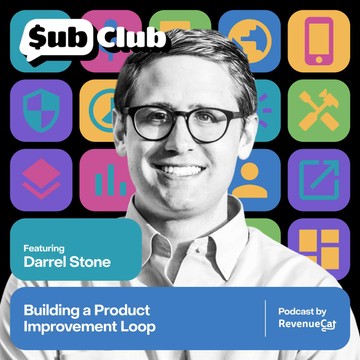
4 snips
Aug 31, 2022 • 46min
Building a Product Improvement Loop — Darrell Stone, Citizen
On the podcast I talk with Darrell about going from zero to an 8-figure ARR in just 18 months, building a product improvement loop combining user research and A/B testing, and why expecting failure is one of the keys to success.Top Takeaways📈 Going from 0 to an 8-figure ARR in 18 months is doable🙈 Sharing and selling data isn’t necessary to build and scale subscription apps🎰 Structuring product development as a “bet” liberates you from needing to be rightAbout Darrell Stone👨💻 Head of Product & Design at Citizen, the number one public safety app in the U.S.💪 Darrell defined and scaled Citizen's consumer subscription product with a dual focus on acquisition and retentive, life-saving features.💡 “Product [development] in consumer tech is very much a team sport. You have to approach it through the mindset that you're building a team that's going to win a thing.”👋 LinkedIn and TwitterLinks & Resources‣ Citizen App‣ Citizen’s Career Page Follow us on Twitter‣ David Barnard‣ Jacob Eiting‣ RevenueCat‣ Sub ClubEpisode Highlights[2:03] Leaving Uber to scale a startup: Darrell discusses the reasons why he left Uber to start a subscription app.[5:20] Making the world a safer place: Citizen is a “moderated safety app.” It has more than 100 people actively listening to police scanners to enable provide real-time information about what is happening in communities.[10:57] Charging for a public safety app: Darrell discusses the tension between monetization and Citizen’s mission of keeping people safe. He outlines the difference between the freemium and paid products.[19:15] Citizen on the world stage: Darrell talks about taking Citizen global and how the company “a safety marketplace” to the world.[22:20] World pricing: Darrell offers potential strategies for global cost and price differences.[24:52] Understanding users: Darrell gives insight into how user research shapes A/B testing, product development and the improvement loop.[30:05] Antifragile product development: One of Darrell’s go-to recommendation for people in product is Annie Duke’s interview on The Knowledge Project. Bumps are inevitable during the product development process — it’s how you manage it that matters.[33:14] Lessons learned for top unlocks: Darrell discusses tips for being more right than wrong to unlock a real value-add, and how this took the company from zero to eight figures in ARR.[37:45] Buy versus build: David and Darrell talk about how bringing on third party tooling can help achieve long-term company goals.[41:45] Aligning the team to the bigger vision: Darrell explains how clear goals, rapid feedback loops and celebrating incremental progress help keep teams motivated through the whole process.


